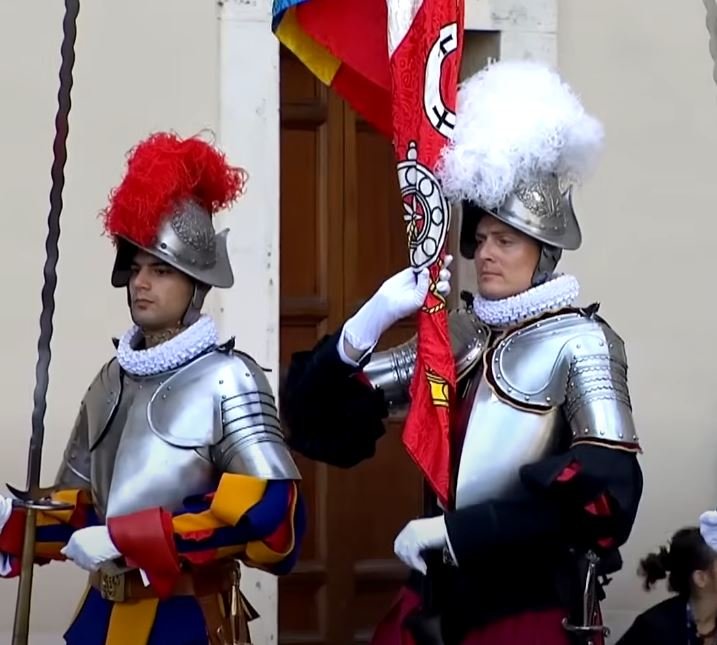
The Swiss Guard has been protecting the Pope at the Vatican’s gates for centuries, acting as a living mural. Their loyalty and poise are both incredibly modern and historic. However, beneath the elaborate ceremonies and fancy uniforms is a straightforward financial query: what is the true salary of these hardworking men?
The monthly pay for a Swiss Guard member appears surprisingly low at first glance. According to reports, tax-free guard salaries range from €1,300 to €1,500. This puts their yearly income between €15,600 and €18,000, which is a small amount by Swiss standards but has a completely different meaning when considered in the context of Vatican City’s distinct microeconomy.
Swiss Guard Salary and Service Overview
| Detail | Information |
|---|---|
| Employer | Vatican City (Holy See) |
| Monthly Salary | €1,300 to €1,500 (tax-free) |
| Annual Salary | Approx. €15,600 to €18,000 |
| Free Housing | Yes |
| Free Meals | Yes |
| Paid Vacation | 30 days annually |
| Family Schooling | Free for children at the Swiss School in Rome |
| Marriage Eligibility | After five years of service |
| Service Requirements | Swiss, Catholic, unmarried, aged 19–30, military-trained, minimum height 1.74m |
| Current Corps Size | 135 guards as of 2025 |
The Vatican lowers these guards’ living expenses considerably by paying for their housing and meals. A strikingly effective compensation structure is depicted by the free meals, lodgings tucked away inside Vatican City’s fortified walls, and additional perks like tax-free shopping and free child education. The lack of daily urban expenses and commuting costs, which can be burdensome in cities like Rome, is especially advantageous.
The debate over just compensation for security professionals has heated up during the last ten years. Entry-level soldiers and police officers in many European cities start out earning more than the Swiss Guard. However, in contrast to those public servants, Swiss Guards serve in accordance with a tradition that began in 1506, taking an oath to personally defend the Pope. In addition to patrolling and responding, their role is to represent the constant presence of protection during papal changes, political upheavals, and even spiritual upheavals.
The Swiss Guard may seem to many like a Renaissance painting—rich in history, immaculate in appearance, but frozen in time. Their changing roles, however, paint a very different picture. The Swiss Guard has included a great deal of training in contemporary security techniques since the attempted assassination of Pope John Paul II. These include counter-sniper exercises, tactical driving, hostage rescue, and even anti-terrorism coordination with Italian special forces. Their responsibility is now very real and not just ceremonial.
However, their compensation is essentially unchanged despite these increased responsibilities. In contrast, private sector personal security experts can make up to $120,000 annually, particularly if they work for well-known clients like tech tycoons or entertainers. These positions, which are frequently more commercial and less symbolic, showcase a remarkably similar skill set but a very different valuation.
When you take into account the psychological and emotional demands of the job, this distinction becomes especially evident. Swiss Guards are expected to serve far from home, stay single for five years, and adhere to a set of deeply ingrained religious norms. For many, this is a calling rather than just a job. However, the tangible benefits might not fully compensate for the sacrifice they made.
Under Colonel Christoph Graf’s direction, internal reforms have begun to take shape in recent years. The Vatican has indicated a gradual but steady commitment to updating the conditions of service by emphasizing barrack renovations, psychological well-being initiatives, and more stringent hiring procedures. However, despite the pressure that global inflation is placing on essential goods and services, there are still surprisingly few conversations about pay increases.
It’s also important to consider the Guard’s demographic makeup. These are not merely traditional Catholic Swiss men. More and more recruits come with advanced degrees, fluency in multiple languages, and previous experience in high-level military units. Despite their blatantly obvious professional skill, they frequently accept much lower pay than they could get elsewhere out of loyalty.
The Vatican keeps morale high through ongoing recognition ceremonies and strategic alliances with Swiss organizations. However, monetary compensation will unavoidably become a more important issue as hiring becomes more competitive and security issues become more complicated. The Vatican will soon have to make a decision on whether to stick to its traditions or update its financial policies to reflect contemporary norms.
The Swiss Guard continues to be a respected and questioned institution, remarkably effective at both high-level security and ceremonial duties. Their discipline and conviction are demonstrated by their attendance at conclaves, their watchful positions during Easter Mass, and their poise in the face of geopolitical threats. However, that tradition runs the risk of becoming an unsustainable expectation in the absence of concurrent financial growth.
The low pay of the Swiss Guard raises interesting social issues. What purpose does tradition serve in contemporary institutions? In roles that combine national pride, identity, and faith, how do we quantify sacrifice? Their story is similar to more general conversations in underpaid service sectors where people are motivated more by purpose than by compensation, such as civil defenders, teachers, and healthcare professionals.
The most important lesson is probably this: the Swiss Guard is still one of the few occupations with a strong foundation in personal conviction in a field where transactional careers predominate. The rewards are modest, at least in terms of money, the road is narrow, and the standards are high. However, the call goes beyond money for those who carry the halberd and wear the vibrant stripes.
